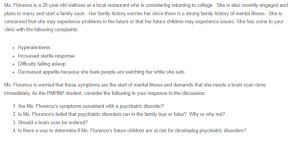Psychiatric Assessment of a Young Adult with a Family History of Mental Illness
Ms. Florence, a 20-year-old waitress, is experiencing hyperalertness, increased startle response, difficulty sleeping, and a decreased appetite due to feeling watched. Given her family history of mental illness, she fears these symptoms may indicate a psychiatric disorder. It is essential to assess if her symptoms align with such a disorder, determine the necessity of a brain scan, and consider the genetic risks for her future children.
Assessment of Symptoms
The symptoms displayed by Ms. Florence are quite reminiscent of a probable psychiatric disorder but are not isolated symptoms: Elevated alertness and sensitivity to stimuli, a heightened jerking reflex, and sleep disorders are characteristic of reactions to various anxiety disorders, including GAD or PTSD (Du et al., 2022). Also, the feeling of being observed while consuming food could be an expression of paranoid features observed in patients with anxiety or various psychological disorders. Then again, these manifestations could be caused by stress or other environmental conditions and not be the logical consequence of a psychiatric condition.
Family History and Genetic Risks
Psychiatric disorders are known to have some hereditary characteristics. Schizophrenia and depression are examples of mental disorders that are influenced by genes (Andreassen et al., 2023). However, this is a multifactorial inheritance process that involves the participation of numerous genes and environmental factors. Even if the patient has a family history of mental disorders, this does not imply that the patient, or any of her children, will inevitably develop a mental illness.
Recommendation for Brain Scan
From this vantage point, there is no need to have a brain scan yet. Imaging this type is often done only when the patient has neurological signs consistent with structural pathology of the brain. Since her symptoms point more towards anxiety or even stress-related disorders, a psychiatric evaluation should be the first step.
Conclusion
Ms. Florence does not have a medical emergency requiring obligation imaging but certainly needs a psychiatric assessment. Despite the fact that she seems to have a genetic link in her family, this does not guarantee that she or her children will have a mental health disorder. Notably, genetic counseling could give her the support that she needs.
References
Andreassen, O. A., Hindley, G. F. L., Frei, O., & Smeland, O. B. (2023). New insights from the last decade of research in psychiatric genetics: discoveries, challenges and clinical implications. World Psychiatry, 22(1), 4–24. https://doi.org/10.1002/wps.21034
Du, J., Diao, H., Zhou, X., Zhang, C., Chen, Y., Gao, Y., & Wang, Y. (2022). Post-traumatic stress disorder: a psychiatric disorder requiring urgent attention. Medical Review, 2(3), 219–243. https://doi.org/10.1515/mr-2022-0012
ORDER A PLAGIARISM-FREE PAPER HERE
We’ll write everything from scratch
Question
Ms. Florence is a 20-year-old waitress at a local restaurant who is considering returning to college. She is also recently engaged and plans to marry and start a family soon. Her family history worries her since there is a strong family history of mental illness. She is concerned that she may experience problems in the future or that her future children may experience issues. She has come to your clinic with the following complaints:

Psychiatric Assessment of a Young Adult with a Family History of Mental Illness
- Hyperalertness
- Increased startle response
- Difficulty falling asleep
- Decreased appetite because she feels people are watching her while she eats
Ms. Florence is worried that these symptoms are the start of mental illness and demands that she needs a brain scan done immediately. As the PMHNP student, consider the following in your response to the discussion:
- Are Ms. Florence’s symptoms consistent with a psychiatric disorder?
- Is Ms. Florence’s belief that psychiatric disorders run in the family true or false? Why or why not?
- Should a brain scan be ordered?
- Is there a way to determine if Ms. Florence’s future children are at risk for developing psychiatric disorders?

